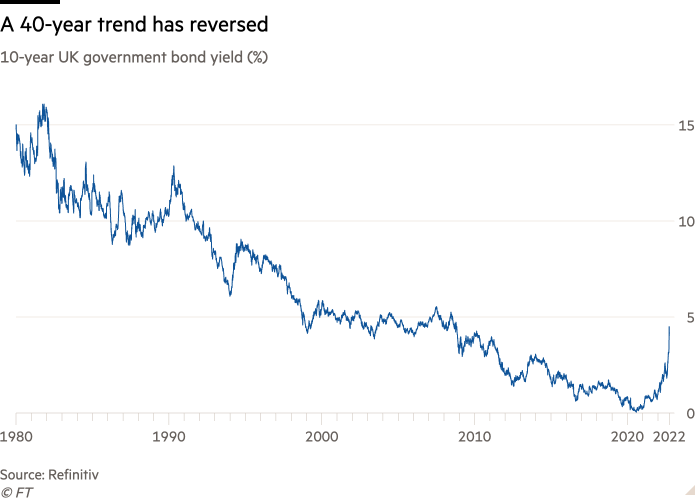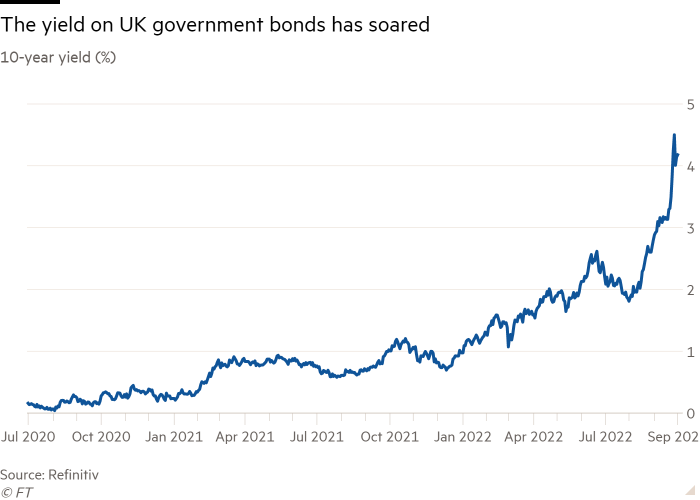Liz Truss has been weighed in the balance and found wanting. So, too, has Kwasi Kwarteng. A week of unnecessary and damaging turmoil has proved this. But behind it is an even bigger danger. The only sort of leader more dangerous than the rogue the UK used to have is the zealot it has now. The dominant characteristic of zealots is their conviction that reality must adapt to their desires, rather than the other way around. If this attitude to life is adopted by an individual, it can do great damage to those close to them. In political leaders, the result may be a disaster for the country.
The irony is that for these people “the market” is god and economics 101 their religion. Yet actual markets have rebuffed them, as investors fled sterling and gilts, causing such mayhem that the Bank of England’s Financial Policy Committee was driven to intervene, in an attempt to rescue the government and an ill-regulated pensions industry from their follies.
The reality is that Truss does not have a growth plan. She has a “growth plan” — a magical potion into which she sprinkles the reversal of recent tax increases, freedom for bankers’ bonuses and lower taxes for the prosperous, says “abracadabra” and suddenly trend productivity growth quadruples, conjuring 2.5 per cent annual growth.
Such dreams might be amusing if they were not so perilous for the country.

First, they come on top of a long line of fibs — fibs that justified excessive fiscal austerity after the financial crisis, fibs that Brexit would bring prosperity, fibs that the Northern Ireland protocol had solved the Brexit conundrum and the fibs that the government would do something serious about levelling up lagging regions of the country. Now those in charge promise a huge jump in productivity growth. In its analysis for the Tony Blair Institute, Oxford Economics concludes that aggregate output might be cumulatively 0.4 per cent higher five years hence. The mountain labours and brings forth a mouse.
Second, while this is not a growth plan, it is a plan for inequality and insecurity. The recent mayhem will surely reinforce the government’s desire to go in the direction of slashing welfare and public services. They would then be shifting incomes from the bottom to the top of the distribution in the midst of a cost of living crisis, in a country with the highest inequality of disposable incomes in the high-income democracies, after the US. They will justify this with the old canard that countries are like companies and so cannot afford high public spending. Eliminating foreign aid would add some of the poorest people on the planet to the unnecessary victims.
This parliament was not elected on any such programme. The party has been captured by zealots indifferent to reality or simple decency. As John Burn-Murdoch notes, “The Tories have become unmoored from the British people”.

Finally, the government has savaged the credibility of public institutions and UK policymaking: they have assaulted the Treasury, repudiated fiscal transparency, caused mayhem in the gilt and foreign currency markets and forced the Bank into an ill-timed return to quantitative easing. Populist movements always despise constraining institutions run by “elites”. But institutions are the bulwark of a civilisation. The Conservative party used to understand just this. No longer. Investors now know this. It is self-evident.
The UK’s longer-term economic performance must indeed improve if the desires of its people for a better life are to be realised. If the government wants to do something useful about this, it might dust off the report of the London School of Economics’ Growth Commission of 2017. Better incentives are indeed a part of the answer, but only a part. This is why systematic tax reform would be desirable. There must also be difficult deregulation, notably of land use. The state must supply first-class public goods, in the understanding that these are a social benefit, not a cost. There must be fiscal and monetary stability. There must be far higher investment in physical and human capital, both public and private. There must be higher savings. There must be a pro-growth regional policy. There must be an internationally open economy. There must, not least, be stable and credible policies, not the constant risk of another trade war with our closest neighbours.
Truss and Kwarteng will not deliver this. Unfunded tax cuts and investment zones will certainly not deliver this. Another big jump in inequality will not deliver this. These people are mad, bad and dangerous. They have to go.


